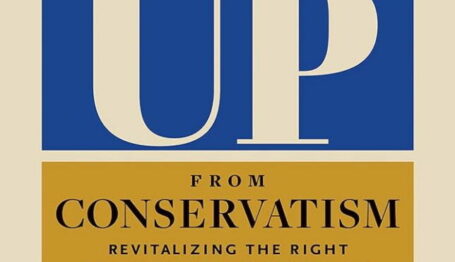Special Report
The Left’s Next Culture War: How the Free Enterprise Project is Fighting Back
 A shareholder proposal on the proxy statement of Amazon mandated that for every open board seat, you must interview a woman and an underrepresented minority. Amazon opposed that resolution. For six weeks after Amazon said no, the liberal media was hammering them, saying, “How dare Jeff Bezos oppose diversity! What is Amazon’s board thinking?” Credit: Mike MacKenzie. License: www.vpnsrus.com.
A shareholder proposal on the proxy statement of Amazon mandated that for every open board seat, you must interview a woman and an underrepresented minority. Amazon opposed that resolution. For six weeks after Amazon said no, the liberal media was hammering them, saying, “How dare Jeff Bezos oppose diversity! What is Amazon’s board thinking?” Credit: Mike MacKenzie. License: www.vpnsrus.com.

The Left’s Next Culture War (full series)
Remaking the American Corporation One Board Room at a Time | Using Corporate Rating Indexes | Corporate Virtue Signaling and Expanding Stakeholders | How the Free Enterprise Project is Fighting Back
Summary: The political Left has had increasing success over the last decade compelling corporate America to actively support liberal positions on political, economic and social issues. Going under the saccharine heading “Corporate Social Responsibility,” this leftist campaign has succeeded in getting more of their own hired as CEOs, on the boards of directors, and in the C Suite. In recent years the campaign has persuaded many large companies to dissociate themselves from the National Rifle Association and to cheerlead for the LGBTQ agenda.
Justin Danhof is director of the Free Enterprise Project at the National Center for Public Policy Research. He has waged a lonely battle against the creeping leftism in corporate America. He recently sat down with David Hogberg, a former senior research associate at the Capital Research Center, for an interview.
Hogberg: One thing that your free enterprise project is fighting back with is something you call the “Diversity Resolution.” What is that?
Starting last year and continuing into this year, I began filing what I call “True Board Diversity” resolutions. So when left-wing activists file resolutions demanding affirmative action on board selection, they claim that their stated goal is that corporation should avoid groupthink. That is, boards need a diverse group of members, including women and minorities, so that they are not walking in lockstep.
Well, I figured that if the true goal is to avoid groupthink, then maybe they should get people in the room who actually think differently. So I started putting forward resolutions that companies should consider viewpoint diversity when they are looking for new board members. What the resolution means is that if board members are in lockstep on social and political issues, then they need to consider hiring people with dissenting views. We aren’t going to get corporations out of politics anytime soon. Thus, if companies are going to get involved in these political and social campaigns, then they need to hear from conservative voices, not just liberal ones. It would be beneficial for companies to know what conservatives think before they jump into the fray on the liberal side of these issues.
Hogberg: Are there other reasons why companies should adopt your resolution?
Yes. When companies take action that liberals approve, they may be offending the more conservative parts of their customer bases, and they may not realize that. A conservative board member could warn them. And not just customers, but a good portion of a company’s investor base might be offended as well. Having more diverse points of view on corporate boards would be in the long-term interest of investors as well.
Second, it would help the companies in Silicon Valley and the Pacific Northwest that are perceived as liberal but constantly protest that label. If this is just a perception problem, as they often claim, then this resolution is a tool to help them overcome that perception problem. Interestingly enough, the more mainstream America have adopted this resolution. The Silicon Valley and Pacific Northwest companies are the only ones, thus far, that have fought it.
Hogberg: Amazon was particularly hostile to this resolution, correct?
When I presented it at Amazon’s shareholder meeting, I said that nominating people based solely on gender was sexist, that nominating them based solely on race was racist. What I mean by that is that if you nominate based solely on gender or race, then you are saying that all women think alike, that all blacks think alike, and so on.
Well, as I’m presenting the resolution, I’m getting booed, I’m getting heckled, I’m getting called a KKK member. After the meeting some guy rushed up to me and said he was worried that I’d be late to my next book burning. That reaction just shows that so many of these people rarely if ever hear an opposing viewpoint. It demonstrates all the more reason why the Free Enterprise Project’s diversity resolution is necessary.
Hogberg: Let me read a brief passage from a news article from CNNBusiness by Danielle Wiener-Bronner about the Diversity Resolution: “Generally, shareholder proposals tend to try to push companies to adopt more progressive policies. NCPPR’s motion is unusual because it comes from an explicitly conservative perspective, and because it wants to bring politics into the boardroom—something most corporations avoid.”
I had to do a double-take when I read that. Did you?
Well, CNN interviewed me and ran an article about the resolution that wasn’t a hit piece. So, we should consider that a win.
But otherwise, that quote is just laughable on its face. Almost everything is political these days, and corporate America is the head of that snake. And politics in corporate America is increasing. It’s certainly not waning in any sense of the word. It’s a wild assertion to suggest that I’m the one injecting politics into this arena. All I’m trying to do is balance out the amount of liberal politics that is already in corporate America.
Hogberg: You have had some success with protecting employee speech, correct?
Sure. But first I should note that five companies—Walgreens, CVS, Pepsi, Gap, Walmart—have adopted the diversity resolution. So there is hope.
Regarding employee speech, we called it the Employee Conscience Protection Project. What spurred this was the ousting of Brendan Eich who was CEO of the internet company Mozilla. Activists in California had gone through the database of contributors to Proposition 8 that defined marriage as between a man and woman in California. It passed in California, by the way, with about 53 percent of the vote. The activists discovered, six years after the fact, that Eich had donated $1,000 to support Proposition 8. Well, the Left came with their pitchforks and their silver platter and demanded his head. When it was clear that the board was going to fire him, he resigned.
Well, we at the Free Enterprise Project did some research and found that other people had also lost their jobs because of private political activity. Well, we wondered how that could happen in America. Then I found an article by the legal scholar Eugene Volokh that noted that half of Americans live in a jurisdiction where there is no protection for employees whose employers take action against them for private political activity. So, we filed shareholder resolutions with a large number of companies asking them to add employee protection for political activity into their employment policies. To date, 13 companies that represent more than five million American workers have adopted that proposal.
Hogberg: How far behind is the political right on corporate activism, and why do you think the political right lags the pollical Left on corporate activism?
I’m about the only one on the right working on this, and working full-time I can file about 20 shareholder resolution a year. There are dozens of groups on the Left doing this, and they file between 400-500 resolutions every year. Corporate rating indexes are also very influential, and those are all on the Left. The political right is not even on the playing field when it comes to rating indexes.
Then there are “fast action responses” where the Left responds almost immediately to some event and calls on action from corporate America. The #BoycottNRA campaign in the wake of the Parkland shooting was an example of that. Another example happened in Georgia with a religious freedom bill. By all accounts the Republican Governor of Georgia, Nathan Deal, was going to sign that bill. Indeed, some version of that bill had become law in 30 other states. But the political Left pushed corporate America into action very quickly. Movie companies said that they were going to stop making movies in Georgia if Governor Deal signed the bill. AMC said that it would stop making The Walking Dead in Georgia, and the NFL came down with a hammer, saying that Atlanta would no longer host any Super Bowls. And Deal vetoed the bill.
We don’t do fast action responses on the right.
Editors’ Note: Some faith-based firms have been developing investing indexes or screens. Inspire Investing maintains Inspire Impact Score, which the firm describes as “a faith-based ESG (environment, social, governance) security selection methodology that seeks to identify the most inspiring, biblically aligned companies in the world.” Timothy Plan, a firm catering to investors committed to Biblically Responsible Investing, maintains a “Know Your Investments” chart to show the way they screen companies. The firm avoids companies that are involved in or profit from practices that violate scripture.
Hogberg: For conservatives and, really, for anyone who wants to get corporations out of politics, what can they do?
Get engaged. Become a stakeholder. Businesses have signaled that they are beholden to stakeholders. If you want to have an impact, to affect change at the corporate level, then you need to engage corporations in the same way the Left does.
What you don’t want to do is disengage. There is a big desire among conservatives to boycott a company when it is doing something they don’t like. For example, conservatives called for a boycott of Nike because it hired Colin Kaepernick. The Left does it the opposite way. When a company does something they don’t like, they engage more with that company. So my advice to conservatives is don’t divest, don’t boycott because it will not have the desired effect. Engagement is the way to go.



